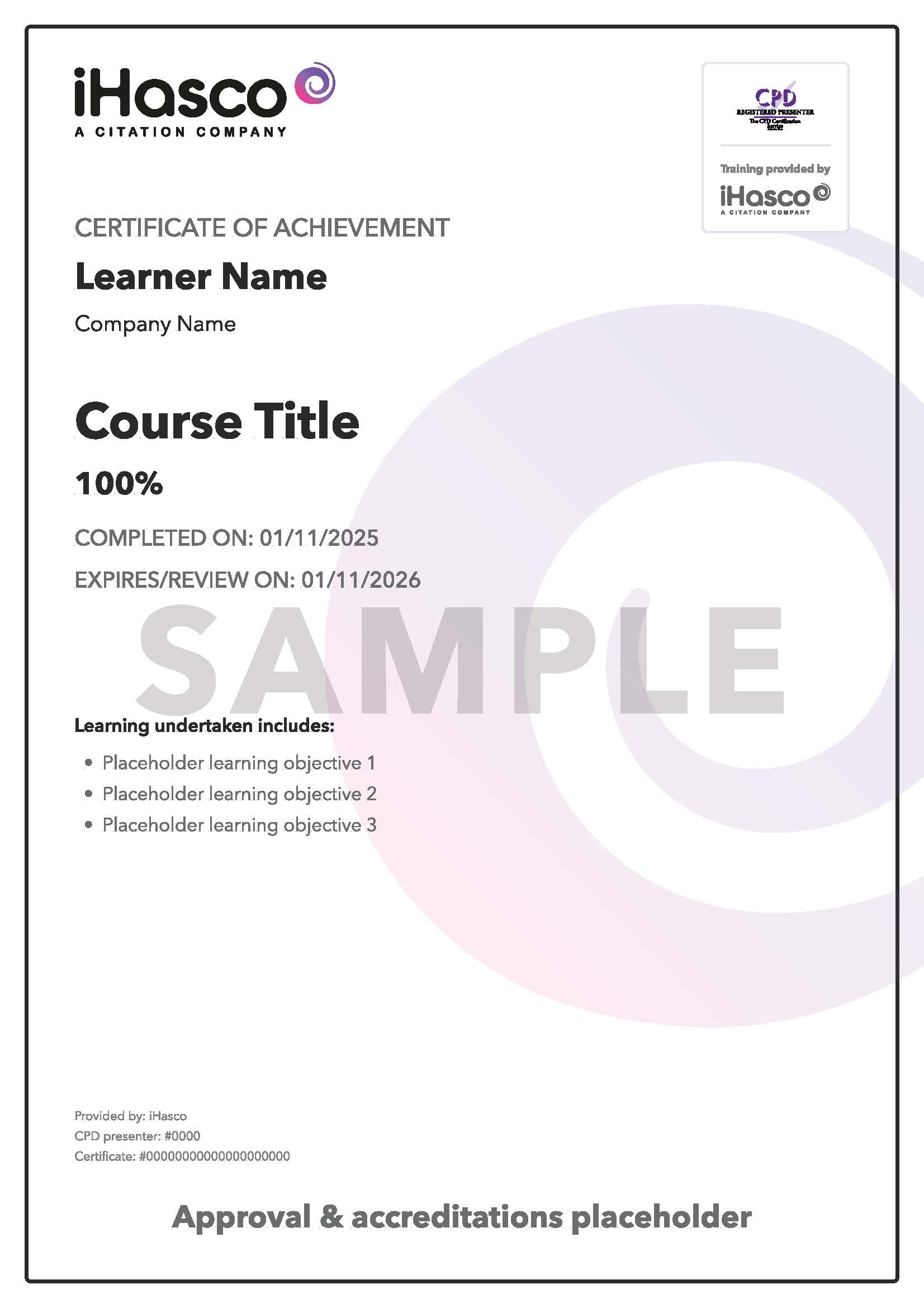

Incorrect handling, lifting and carrying causes around 21% of all non-fatal workplace injuries
- Health & Safety
- 40 languages
- 30m
Buy now
Multiple use from as little as £5.00 pp
Single use £30.25 +VAT
- Price based on an average client order. Call us for a bespoke quote
- Multiple users across this or any of our other courses
- Designated Account Manager and full phone/email support
- Full access to our product
- Single user on this course
- 60 days’ unrestricted use
- Upgrade to subscription based training any time to suit you
Learning outcomes
-
Illustrate how to lift safely using techniques such as ‘LITE’ and ‘TILE’
-
Review the steps to carry out ‘LITE’ assessments to reduce the risk of injury
-
Identify bad postural habits and learn how to work in the ‘Power Zone’
Your trial awaits!
Covered in this Manual Handling course
Course contents
This online Manual Handling training course is broken down into 4 sections
-
1Your back during Manual Handling
-
2Daily Tasks
-
3LITE Assessment
-
4Techniques
About this Manual Handling training course
Incorrect manual handling is responsible for more than a third of all workplace injuries that are reported to authorities each year.
If manual handling is not carried out properly it can have significant consequences on your health (musculoskeletal disorders). A manual handling risk assessment may be in order depending on if your workplace is handling heavy loads.
How does Manual Handling training support back health and posture?
Maintaining a healthy back is also vital in enabling you to meet the demands of your everyday responsibilities – at work, at home, and during your leisure time. Manual Handling training equips you with all the tools you need to protect your back whilst conducting a wide variety of tasks. This online Manual Handling course looks at safe moving and handling, the ‘LITE’ technique (Load. Individual. Task. Environment.), and explains why safe workplace lifting is so important to your everyday health.
iHasco Manual Handling Training courses
Effective Manual Handling training can help ensure best practices and reduce the likelihood of injuries as a direct result of manual handling. Our IOSH & RoSPA approved Manual Handling training is for all levels of staff that undertake manual handling operations. Just ask us for a free no-obligation trial today!
Not quite what you were looking for? Discover related courses on Manual Handling including tyres or Moving and Handling People to see how we can help your organisation in reducing absences, preventing injuries, and saving costs!
Presented by
Other people also bought
The importance of Manual Handling Training
It's important that you comply with the law and understand the positive impact this training course can have on your organisation and employees.
Find out moreAvailable in 40 languages
All-inclusive
Machine-translated* content is included for free with all our popular courses.
It covers LMS navigation, course transcripts and test questions. If you don’t see a course listed in the language you require, just let us know.
*Content which is not English may be machine-translated and is for assistive purposes only. We cannot guarantee the accuracy of translations.
Our most popular languages
Manual Handling Training certificate

Download and print
Each of our courses ends with a multiple-choice test to measure your knowledge of the material.
This Online Manual Handling training programme ends with a 20-question multiple choice test with a printable certificate.
As well as printable user certificates, training progress and results are all stored centrally in your LMS (Learning Management System) and can be accessed any time. From there, you can re-print certificates; check and set pass marks and use the system as proof of commitment to ongoing legal compliance.
What does my Manual Handling Training certificate include?
Your Manual Handling Certificate includes your name, company name (if applicable), name of course taken, pass percentage, date of completion, expiry date and stamps of approval or accreditations by recognised authorities such as CPD and IOSH approved meaning other companies will recognise this great achievement in developing your staff.
Please note if you are using our course content via SCORM in a third party LMS then we are unable to provide certificates and you will need to generate these in your host LMS yourself.
4,503 real user reviews
4.8
out of 5
Loading reviews…
Excellent Course
Increasd my understzndingznd knowkedge on manual handling
Informative
Clear and concise training course.
Very accessible and Helpful
Good insights, nice pace and pragmatic, without being onerous.
Really helpful
This course has been really useful in aiding with our daily health and safety briefings.
This course can help u to understand the best way of using constructions equipment
It is perfect for learning in construction site with equipment
Good training. Thank you.
This user gave this course a rating of 5/5 stars
To long
This user gave this course a rating of 5/5 stars
very good
Very useful and done well
Why is this Manual Handling training important?
Compliance
It’s important that you comply with the law and know how it affects you and how you work.
Under The Manual Handling Operations Regulations 1992, Manual Handling includes the lifting, lowering, pushing, pulling, carrying and movement of anything by hand or bodily force. The Management of Health & Safety at Work Regulations 1999 (13(2)) also require that every employer must ensure that their employees are provided with adequate health and safety training.
Council Directive 90/269/EEC issued on May 29, 1990, sets forth minimum health and safety standards for manual handling of loads posing a risk, particularly for back injuries among workers.
What does Manual Handling training mean for my company?
Providing manual handling training means that your business will be kept safe from any liability which may arise from untrained staff. These accreditations also mean that you adhere to multiple regulations regarding manual handling.
Employers must ensure that workers receive proper training and information on how to handle loads correctly, and the risks they might be open to, particularly if these tasks are not performed correctly. – Council Directive 90/269/EEC, Article 6, Section 2
The Benefits of Manual Handling Training
Providing manual handling training offers several benefits for both workers and employers. Here are some of the top advantages of manual handling training:
- Reduced Risk of Injury: Manual handling training can help employees learn how to lift, move, and handle objects safely and efficiently, reducing the risk of injury and MSDs.
- Improved Workplace Safety: By providing manual handling training, employers can create a safer working environment and reduce the number of accidents and injuries in the workplace.
- Increased Productivity: Proper manual handling techniques can help employees work more efficiently, reducing the time and effort required to complete tasks and increasing productivity.
- Compliance with Regulations: Many countries have specific regulations and guidelines related to manual handling, and providing training can help employers comply with these requirements.
- Improved Employee Satisfaction: When employees feel confident and safe in their work, they are more likely to be satisfied with their job and perform better.
Manual Handling Frequently Asked Questions
-
Manual handling refers to the lifting, carrying, pushing, pulling, and moving of objects by hand or bodily force. This encompasses various activities such as lifting boxes, moving furniture, or handling tools. With manual handling tasks being a routine aspect of both workplaces and daily life, training is crucial to prevent injuries and ensure the safe transportation of objects.
-
Common manual handling mistakes are prevalent throughout any business. They occur when members of staff do not follow proper lifting techniques or fail to recognise the potential lifting hazard. Some of the most common manual handling mistakes include lifting heavy loads alone, twisting the body while lifting, carrying objects too far away from the body, and failing to use lifting aids when available.
-
When staff are not trained appropriately, this can result in serious injuries and health problems. Common manual handling injuries include sprains, strains, and herniated discs. These injuries can cause long-term pain, limit mobility, and even require surgery. Additionally, making manual handling mistakes can lead to increased healthcare costs and lost productivity.
-
This Manual Handling course is designed to serve anyone who is required to lift and carry as part of their daily work activities. This can include logistics staff, warehouse workers, heavy manual labourers, construction and building site workers, office staff who carry out regular lifting, delivery drivers and farmers/agricultural workers.
-
Training employees in safe carrying and lifting techniques in the workplace is a legal requirement whenever their job involves lifting, lowering, pulling, or pushing tasks that pose a risk of injury.
-
This online Manual Handling course takes just 35 minutes to complete on any device.
-
To maintain the highest possible training quality, all of our online manual handling courses are accredited by the Continuing Professional Development (CPD) certification service and approved by the Institute of Occupational Safety and Health (IOSH). Both IOSH and CPD accredited qualifications are also internationally recognised.
-
Yes, as with any iHASCO course, you can try it for free at any time without obligation.
















